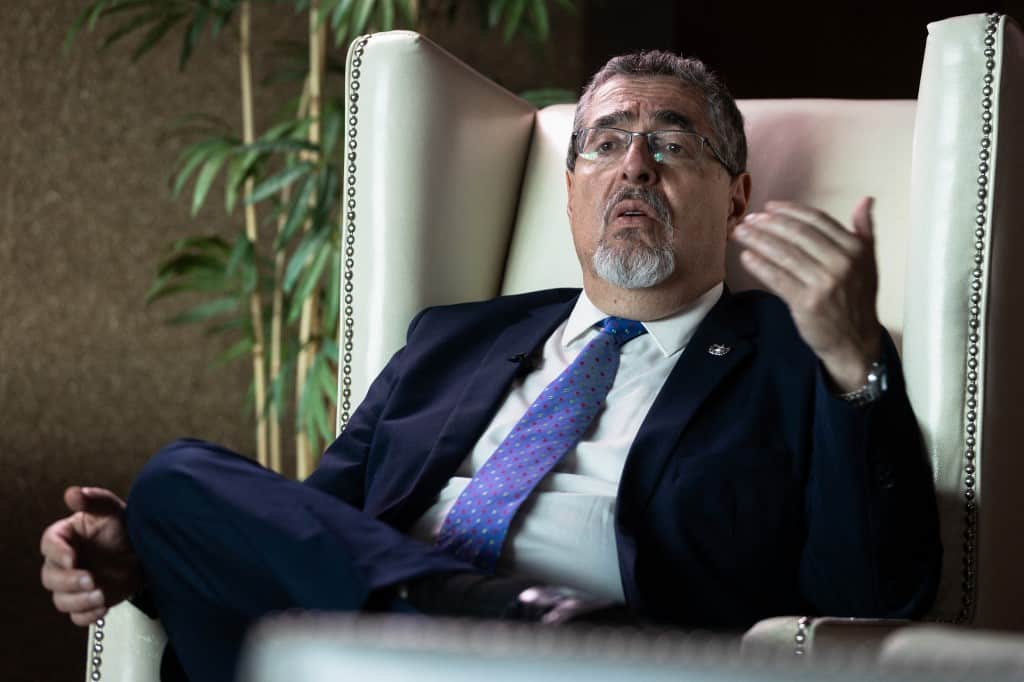The elected president of Guatemala, Bernardo Arévalo, said that he is convinced he will take power on January 14 and will govern without fear, having “blocked” the “coup d’état” that he claims was orchestrated by the “corrupt” Guatemalan political elite.
The Public Prosecutor’s Office, led by the Attorney General Consuelo Porras, requested the removal of his immunity, sought to cancel his Semilla party, accused the Supreme Electoral Tribunal (TSE) of anomalies, and considered the elections “null and void.”
However, the TSE maintained that the results are “unalterable,” and the Constitutional Court (CC) ordered Congress last week to “guarantee” Arévalo’s swearing-in.
In an exclusive interview while visiting Panama on Tuesday during a Central American tour, Arévalo spoke about his future government and the prosecutor’s office’s offensive after winning the elections.
- The prosecutor’s office has not given any respite. Do you still see risks, or are you sure that you will assume the presidency?
I am totally convinced. What the prosecutor’s office has done is fabricate cases, act on nonsense without any basis. But the resolution of the CC and the TSE has been given.
That does not mean that they will not continue to make attempts, but they will not succeed. There is no doubt that we are going to assume.
The support for the government is very broad. There is a convergence of forces in defense of democracy, determined to enforce the electoral result and initiate change.
- It is foreseeable that the onslaught will continue. How will you avoid the possibility of an “institutional” or “military” coup d’état?
A military coup d’état is simply not anywhere on the scene. The Army as an institution has been totally out of the political crisis.
The slow-motion coup d’état that was taking place has been blocked with the resolutions of the CC and the TSE. The coup attempted, through judicial means, to achieve conditions that would alter the popular will and the electoral result. The CC closed the path.
- How will you govern with a minority in Congress and prosecutors and judges who, according to you, respond to the corrupt?
It must be remembered that it is a highly fragmented Congress: 16 parties share the 160 seats. We are working on the possibility of creating conditions for governability through a broad alliance.
We will ask for the resignation of the prosecutor. And there will be an election of judges next year.
There will be difficulties since these political-criminal elites, at least for a while, will continue to be entrenched in some state powers. But the support with which we are arriving makes us foresee that we will have governability to advance.
- If your immunity is removed, do you fear imprisonment? And, given that you seem to have many enemies, do you fear for your life?
Regarding imprisonment, the cases that have been handled by the prosecutor’s office are spurious; they have no evidence. As for the threats of a possible physical attack, we are taking the necessary protective measures to prevent it.
- What are the three main challenges of your future government?
First, to achieve governability to advance in the fight against corruption.
Second, to apply a strategy to combat corruption that progresses gradually but steadily, to recover state institutions and put them at the service of the population.
Third, to start making institutions function to generate development in health, education, infrastructure, which responds to the exclusion that has been absent because corruption took over public power.
- How will you fulfill your promise of an anti-corruption war?
It is a systemic problem that will require action in different areas of the State and generate a social political culture that rejects and combats the normalization of corruption.
We will create a national anti-corruption commission that will develop around this strategy to advance in political, judicial, and executive reform, the laws of contracting, to avoid political patronage.
It must be understood as a sustained and gradual struggle. We will not finish it; we will start it. It is an effort that will take time.
We seek that there are no exiles as justice operators, journalists, or political activists who were forced to leave the country due to the onslaughts of that political-criminal structure.
- Are you worried about a disenchantment of the population, especially the indigenous, if their expectations are not soon met?
Undoubtedly it is a huge responsibility: We have awakened the hope of the Guatemalan people in the possibility of change and of recovering institutions to combat corruption. But people also know that it is not a task that is resolved overnight.
They will need proof that there is a real will to carry out this struggle, that we will not surrender to this pact of the corrupt, and that we begin to deliver results in management for the well-being of the population.
- Some analysts say that the offensive seeks to govern you with fear. What do you think?
Fear has been precisely what these political-criminal groups have tried to instill in the population these months, and they have not succeeded. And they certainly have not succeeded in us.
We do not enter this government management with fear; on the contrary, we enter determined and strengthened. We have found widespread social support. If what they expected was to instill fear, they have failed terribly.
- In foreign policy, will you consider establishing relations with China?
We are not going to leave relations with Taiwan; we will maintain them.
- What do you expect from the international community after January 14?
Their support has been fundamental in defending us from the attempted coup. We expect that this support will extend to cooperation and investment for the development of the country.
- What is at stake in Guatemala?
The possibility of really resuming the construction of a democratic state. We will begin a process to recover public institutions. What is at stake is democracy.






